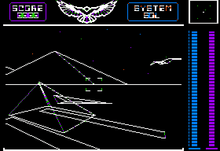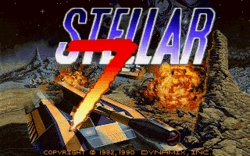Stellar 7
| Stellar 7 | |
|---|---|
|
Title screen of the remake | |
| Producer(s) | Damon Slye |
| Designer(s) | Damon Slye |
| Programmer(s) |
PC: Piotr Lukaszuk (lead), Nels Bruckner Mac: John Selhorst, Carla Wenzlaff |
| Artist(s) | Robert Caracol, Brian Hahn, Mark Peasley, Kobi Miller |
| Composer(s) |
Alan McKean (director) PC: Dale Cooper, Kim Nagel, Don Latarski Mac: Kenneth Rogers |
| Series | Stellar 7 |
| Platform(s) | Apple II, Commodore 64, Amiga, DOS, Mac OS |
| Release date(s) | 1982-1993 |
Stellar 7 is an action-style tank simulation video game based on the arcade game Battlezone in which the player assumes the role of a futuristic tank pilot. The game was originally created by Damon Slye for the Apple II and Commodore 64 in 1983. It was followed by two sequels, Arcticfox (1986) and Nova 9: The Return of Gir Draxon (1991), and was remade in the early 1990s for the 16-bit computers.
Gameplay

The player's tank, the Raven, has a front-facing cannon with an unlimited supply of bullets. The cannon can fire up to two shots at a time. The tank also has a cloaking device that, when triggered, would render it invisible to enemies for about a minute. Gauges on the right side of the screen indicate the amount of shields and power remaining. The tank starts with enough power to cloak twice, and power slowly trickles away as the time passes. The game ends when either shields or power runs out.
Each of the seven levels represents a different solar system, hence the title. The player's objective is to get to the last level and defeat the enemy boss, Gir Draxon. Each level is depicted as a nearly featureless plane dotted by geometric obstacles, some indestructible and most not, and various enemies. After the player destroys a certain number of enemies, a warplink will appear that provides a gateway to the next level.
The special power-ups can be accessed by pressing the tab key to toggle between the different icons at the bottom left of the screen and then pushing enter, or simply by pushing the letter key corresponding to the desired icon. The icon for the chosen item will turn purple while activated. Each power-up is represented by a certain symbol and can be used up to three times throughout the game, depending on the difficulty setting.
Reception
Softline stated in 1983 that "Combining first-rate graphics and sound effects with fast-paced, arcade-style excitement makes Stellar 7 hard to beat in every sense".[1] Video magazine reviewed the Apple II version of the game, describing it as "a severe test for even the most skillful home arcaders" whose "varied action makes it a particularly satisfying game for solo players."[2]:29 In 1991 the DOS version of the remake received 5 out of 5 stars in Dragon.[3]
References
- ↑ Harrington, William (Nov–Dec 1983). "Stellar 7". Softline. p. 22. Retrieved 29 July 2014.
- ↑ Kunkel, Bill; Katz, Arnie (December 1983). "Arcade Alley: Super Gifts for Gamers". Video. Reese Communications. 7 (9): 28–29. ISSN 0147-8907.
- ↑ Lesser, Hartley; Lesser, Patricia; Lesser, Kirk (March 1991). "The Role of Computers". Dragon (167): 47–54.
External links
- Stellar 7 at MobyGames
- Stellar 7 (remake) at MobyGames
- Stellar 7 at GameSpot
- Stellar 7 at Hardcore Gaming 101
